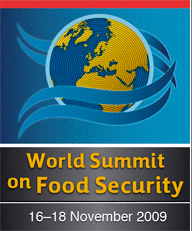World Summit on Food Security 2009
World Summit on Food Security 2009 was a significant event held to address global issues related to food security. The summit took place in Rome, Italy, from November 16 to 18, 2009. It was organized by the Food and Agriculture Organization (FAO) of the United Nations. The primary goal of the summit was to eradicate hunger from the world and ensure a secure and sustainable food supply for all nations.
Background[edit | edit source]
The need for the World Summit on Food Security 2009 arose from the increasing concern over the global food crisis, which had been exacerbated by a combination of factors including rising food prices, climate change, and economic downturns. The summit aimed to bring together world leaders, non-governmental organizations (NGOs), and other stakeholders to commit to eradicating hunger and to promote investments in agriculture.
Objectives[edit | edit source]
The main objectives of the World Summit on Food Security 2009 were to:
- Reaffirm the right of everyone to have access to safe, sufficient, and nutritious food, consistent with the right to adequate food and the fundamental right of everyone to be free from hunger.
- Mobilize high-level political will to promote fair and international trade that benefits development and alleviates hunger.
- Promote new investments in agriculture, particularly in developing countries, to increase food production and productivity.
- Address the challenges of climate change and bioenergy, ensuring that food security goals are not compromised.
Outcomes[edit | edit source]
The summit concluded with the adoption of the Rome Declaration on World Food Security and the Five Rome Principles for Sustainable Global Food Security. Key commitments included:
- Increasing investment in agriculture, especially in developing countries.
- Improving governance of global food issues through better coordination at both the national and international levels.
- Promoting fair and market-oriented trade policies.
- Ensuring that food aid does not displace local production.
- Addressing the challenges of climate change and bioenergy.
Criticism and Challenges[edit | edit source]
Despite the high-level commitments, the summit faced criticism for not setting specific targets or timelines for achieving its goals. Critics argued that without clear benchmarks, it would be difficult to measure progress. Additionally, the absence of some key world leaders was seen as a lack of global political will to address the food security crisis.
Legacy[edit | edit source]
The World Summit on Food Security 2009 set the stage for subsequent international discussions on food security and sustainable agriculture. It highlighted the need for a coordinated global response to the challenges of feeding a growing population in a sustainable manner. The principles and commitments made during the summit continue to influence global food security policies and initiatives.
Navigation: Wellness - Encyclopedia - Health topics - Disease Index - Drugs - World Directory - Gray's Anatomy - Keto diet - Recipes
Search WikiMD
Ad.Tired of being Overweight? Try W8MD's physician weight loss program.
Semaglutide (Ozempic / Wegovy and Tirzepatide (Mounjaro / Zepbound) available.
Advertise on WikiMD
WikiMD is not a substitute for professional medical advice. See full disclaimer.
Credits:Most images are courtesy of Wikimedia commons, and templates Wikipedia, licensed under CC BY SA or similar.Contributors: Prab R. Tumpati, MD

